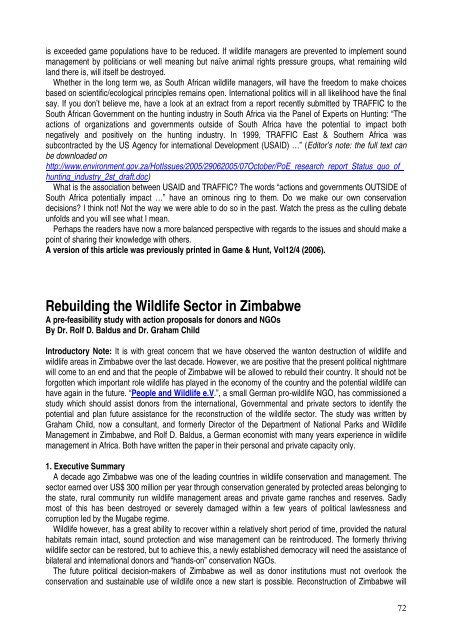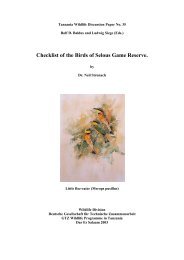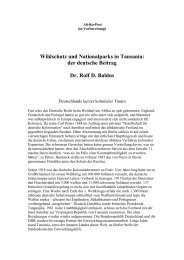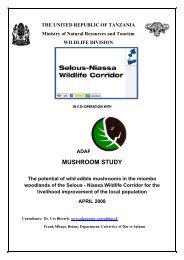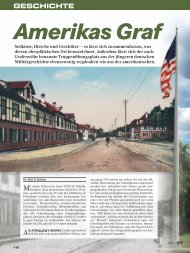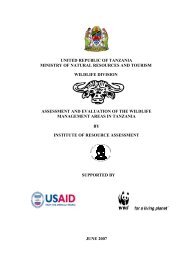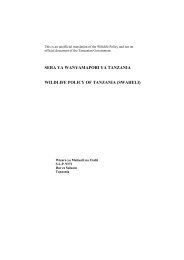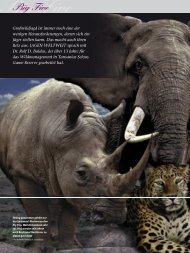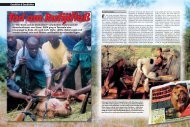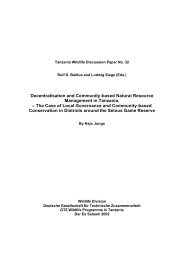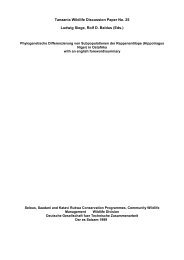African Indaba Articles - wildlife-baldus.com
African Indaba Articles - wildlife-baldus.com
African Indaba Articles - wildlife-baldus.com
Create successful ePaper yourself
Turn your PDF publications into a flip-book with our unique Google optimized e-Paper software.
is exceeded game populations have to be reduced. If <strong>wildlife</strong> managers are prevented to implement soundmanagement by politicians or well meaning but naïve animal rights pressure groups, what remaining wildland there is, will itself be destroyed.Whether in the long term we, as South <strong>African</strong> <strong>wildlife</strong> managers, will have the freedom to make choicesbased on scientific/ecological principles remains open. International politics will in all likelihood have the finalsay. If you don’t believe me, have a look at an extract from a report recently submitted by TRAFFIC to theSouth <strong>African</strong> Government on the hunting industry in South Africa via the Panel of Experts on Hunting: “Theactions of organizations and governments outside of South Africa have the potential to impact bothnegatively and positively on the hunting industry. In 1999, TRAFFIC East & Southern Africa wassubcontracted by the US Agency for international Development (USAID) …” (Editor’s note: the full text canbe downloaded onhttp://www.environment.gov.za/HotIssues/2005/29062005/07October/PoE_research_report_Status_quo_of_hunting_industry_2st_draft.doc)What is the association between USAID and TRAFFIC? The words “actions and governments OUTSIDE ofSouth Africa potentially impact …” have an ominous ring to them. Do we make our own conservationdecisions? I think not! Not the way we were able to do so in the past. Watch the press as the culling debateunfolds and you will see what I mean.Perhaps the readers have now a more balanced perspective with regards to the issues and should make apoint of sharing their knowledge with others.A version of this article was previously printed in Game & Hunt, Vol12/4 (2006).Rebuilding the Wildlife Sector in ZimbabweA pre-feasibility study with action proposals for donors and NGOsBy Dr. Rolf D. Baldus and Dr. Graham ChildIntroductory Note: It is with great concern that we have observed the wanton destruction of <strong>wildlife</strong> and<strong>wildlife</strong> areas in Zimbabwe over the last decade. However, we are positive that the present political nightmarewill <strong>com</strong>e to an end and that the people of Zimbabwe will be allowed to rebuild their country. It should not beforgotten which important role <strong>wildlife</strong> has played in the economy of the country and the potential <strong>wildlife</strong> canhave again in the future. “People and Wildlife e.V.”, a small German pro-<strong>wildlife</strong> NGO, has <strong>com</strong>missioned astudy which should assist donors from the international, Governmental and private sectors to identify thepotential and plan future assistance for the reconstruction of the <strong>wildlife</strong> sector. The study was written byGraham Child, now a consultant, and formerly Director of the Department of National Parks and WildlifeManagement in Zimbabwe, and Rolf D. Baldus, a German economist with many years experience in <strong>wildlife</strong>management in Africa. Both have written the paper in their personal and private capacity only.1. Executive SummaryA decade ago Zimbabwe was one of the leading countries in <strong>wildlife</strong> conservation and management. Thesector earned over US$ 300 million per year through conservation generated by protected areas belonging tothe state, rural <strong>com</strong>munity run <strong>wildlife</strong> management areas and private game ranches and reserves. Sadlymost of this has been destroyed or severely damaged within a few years of political lawlessness andcorruption led by the Mugabe regime.Wildlife however, has a great ability to recover within a relatively short period of time, provided the naturalhabitats remain intact, sound protection and wise management can be reintroduced. The formerly thriving<strong>wildlife</strong> sector can be restored, but to achieve this, a newly established democracy will need the assistance ofbilateral and international donors and “hands-on” conservation NGOs.The future political decision-makers of Zimbabwe as well as donor institutions must not overlook theconservation and sustainable use of <strong>wildlife</strong> once a new start is possible. Reconstruction of Zimbabwe will72


